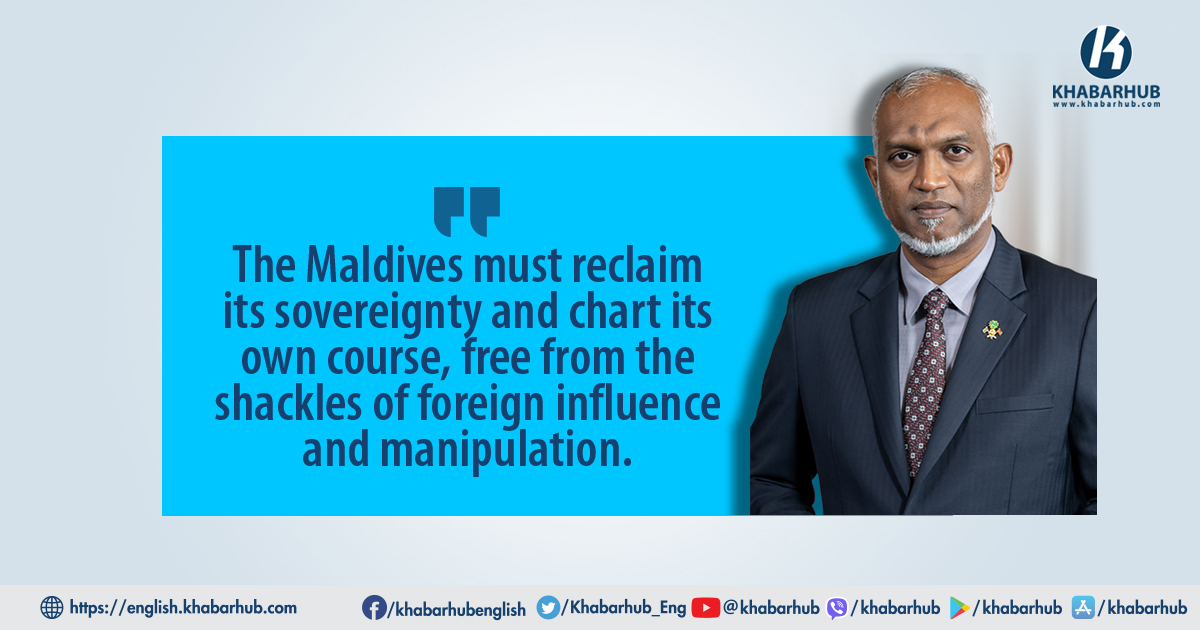In recent years, Maldives has witnessed a creeping shadow of Chinese influence, casting doubt on the sovereignty and autonomy of this island nation.
The recent signing of a defense cooperation agreement between China and the Maldives on 4th March serves as a stark reminder of the dangerous path the Maldives treads, as it inches closer to becoming a mere satellite state in Beijing’s expanding sphere of influence.
This agreement, purportedly aimed at bolstering bilateral ties, conceals a deeper agenda of coercive diplomacy and strategic subjugation, posing dire consequences for the Maldives’ future.
The recent defense cooperation agreement between China and the Maldives represents a dangerous trajectory for the island nation, fraught with perilous consequences
By accepting free military assistance from China, the Maldives risks becoming further entangled in Beijing’s web of influence, ultimately compromising its sovereignty and security.
Through strategic maneuvers such as port calls by Chinese research vessels and military delegations, China seeks to consolidate its foothold in the Indian Ocean Region (IOR), exploiting the Maldives’ vulnerabilities to advance its strategic interests and assert its dominance in the region.
The lack of transparency surrounding the details of this agreement only exacerbates concerns about the Maldives’ susceptibility to Chinese coercion and manipulation.
Moreover, President Muizzu’s eagerness to align himself with China, at the expense of traditional allies like India, threatens to destabilize the region and undermine the strategic balance of power in the Indian Ocean.
The Maldives, once a beacon of independence and democracy, now stands at the precipice of disaster, as it risks being relegated to a mere pawn in China’s geopolitical game.
If unchecked, the consequences of this ill-fated alliance could be catastrophic for the Maldives, with far-reaching implications for regional security and stability.
At the core of China’s encroachment into the Maldives lies its insidious debt-trap diplomacy.
Over the past decade, China has inundated the Maldives with loans and infrastructure projects, ostensibly to spur economic development.
However, these financial lifelines have transformed into shackles of indebtedness, ensnaring the Maldives in a cycle of dependency and economic servitude.
With its coffers depleted and its economy teetering on the brink of collapse, the Maldives finds itself ensnared in a web of debt orchestrated by Beijing, jeopardizing its sovereignty and autonomy.
President Mohamed Muizzu’s leadership has only exacerbated the Maldives’ precarious predicament.
Embracing a pro-China stance, Muizzu has pursued policies that prioritize Beijing’s interests over those of his own nation.
His recent ultimatum to Indian military personnel stationed in the Maldives, coupled with his administration’s eagerness to forge closer ties with China, underscores a troubling disregard for national sovereignty and strategic foresight.
By capitulating to Chinese demands and marginalizing traditional allies such as India, Muizzu has imperiled the Maldives’ security and stability, paving the way for its subjugation to Beijing’s hegemonic ambitions.
The timing of the defense cooperation agreement with China is particularly ominous, coinciding with President Muizzu’s brazen ultimatum to Indian military personnel stationed in the Maldives.
Moreover, Muizzu’s administration has failed to address pressing domestic issues, such as economic instability and social inequality, further undermining the Maldives’ resilience in the face of external pressures.
This move not only undermines the longstanding security partnership between India and the Maldives but also exposes the Maldives to the perils of Chinese coercion and manipulation.
Through strategic maneuvers such as port calls by Chinese research vessels and military delegations, China seeks to consolidate its foothold in the Indian Ocean Region (IOR), exploiting the Maldives’ vulnerabilities to advance its strategic interests and assert its dominance in the region.
Moreover, the opacity surrounding the defense cooperation agreement underscores the Maldivian government’s disdain for democratic norms and transparency.
By brokering deals of such magnitude behind closed doors, President Muizzu’s administration betrays the trust of its citizens and undermines the country’s democratic foundations.
This culture of secrecy and backroom dealings only emboldens China’s efforts to entrench its influence in the Maldives, eroding the nation’s sovereignty and subverting the will of its people.
The ramifications of the Maldives succumbing to Chinese coercion are profound and far-reaching.
Not only does it imperil regional stability by inflaming tensions between India and China, but it also undermines the principles of sovereignty and self-determination that underpin the international order.
As a strategic linchpin in the Indian Ocean Region, the Maldives holds immense significance in the geopolitical landscape of the region.
Its subjugation to Chinese interests not only jeopardizes its own sovereignty but also threatens the security and stability of the entire region.
Muizzu’s administration has been marked by a disregard for democratic norms, transparency, and accountability, as evidenced by the opaque handling of significant agreements and decisions.
President Muizzu’s leadership, marked by its pro-China stance and disregard for democratic principles, only exacerbates the country’s vulnerability.
His eagerness to prioritize allegiance to China over the interests of his own people reflects a worrying trend of subordinating national sovereignty to foreign interests.
Moreover, Muizzu’s administration has failed to address pressing domestic issues, such as economic instability and social inequality, further undermining the Maldives’ resilience in the face of external pressures.
The combination of China’s strategic encroachment and Muizzu’s governance failures paints a bleak picture for the Maldives, highlighting the urgent need for responsible leadership and a steadfast commitment to safeguarding the nation’s interests and autonomy.
In light of these developments, it is imperative for the international community to closely monitor the situation in the Maldives and hold its leadership accountable for any actions that undermine the country’s sovereignty and stability.
Concerted efforts must be made to support the Maldivian people in safeguarding their independence and resisting external pressures that threaten their fundamental rights and freedoms.
Maldives stands at a crossroads, torn between preserving its sovereignty and succumbing to the siren call of Chinese coercion.
The defense cooperation agreement signed with China represents a perilous gambit that could spell disaster for the Maldives and the wider region.
President Muizzu’s leadership, marked by its pro-China stance and disregard for democratic principles, only exacerbates the country’s vulnerability.
The Maldives must reclaim its sovereignty and chart its own course, free from the shackles of foreign influence and manipulation.
The beacon of democracy and independence must not be dimmed by encroaching shadow of Chinese hegemony.









Comment